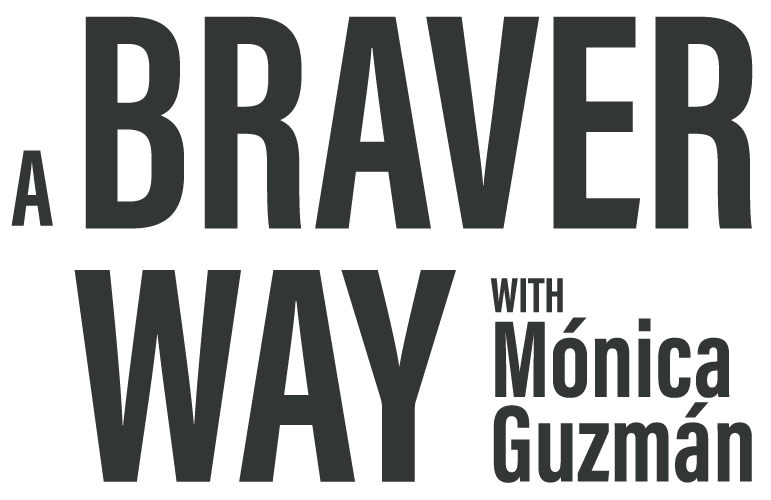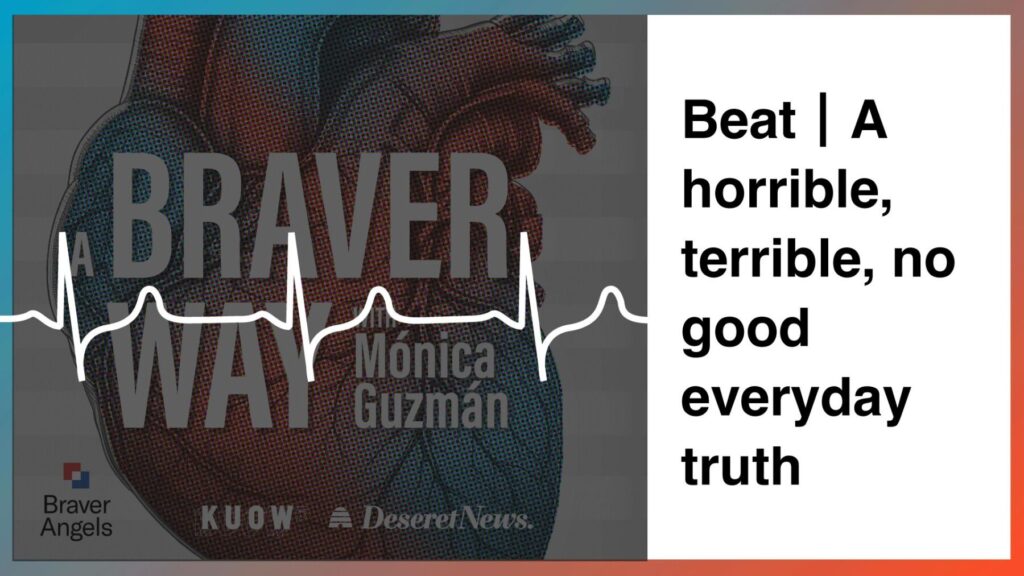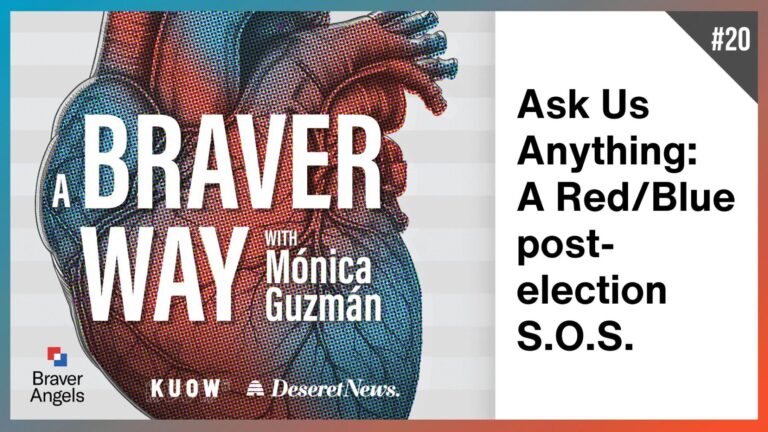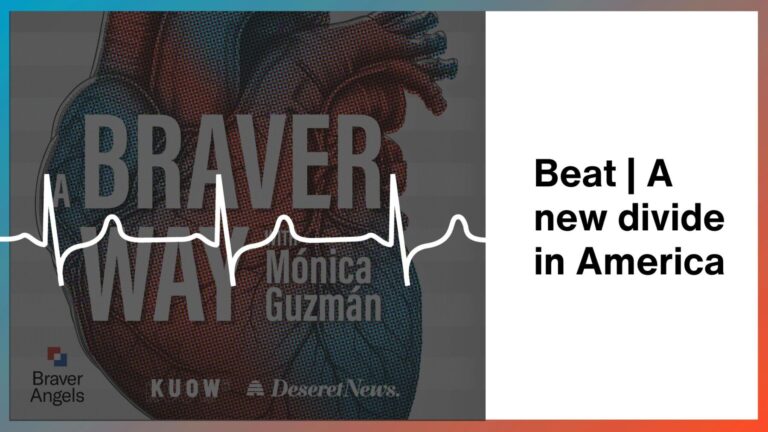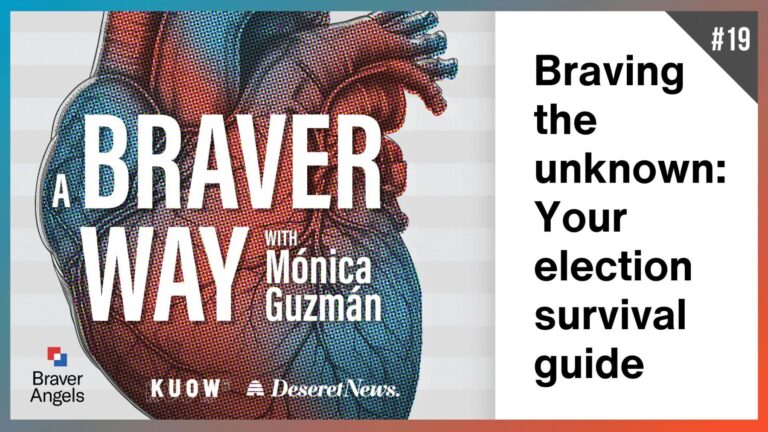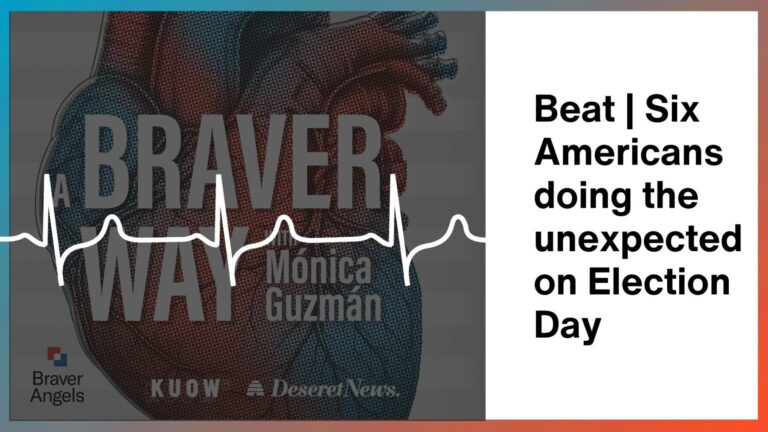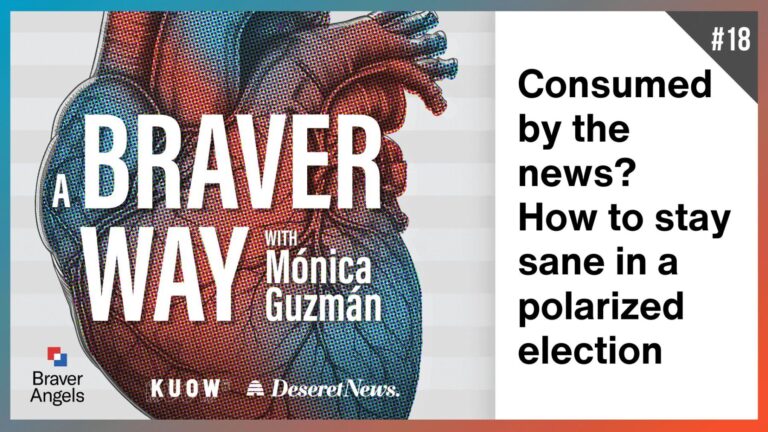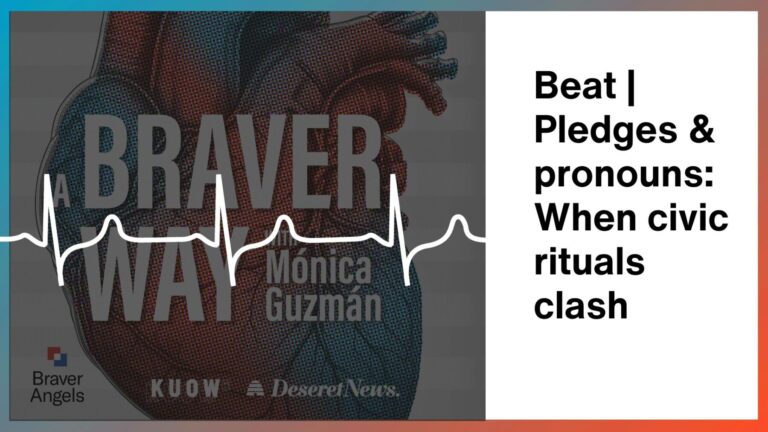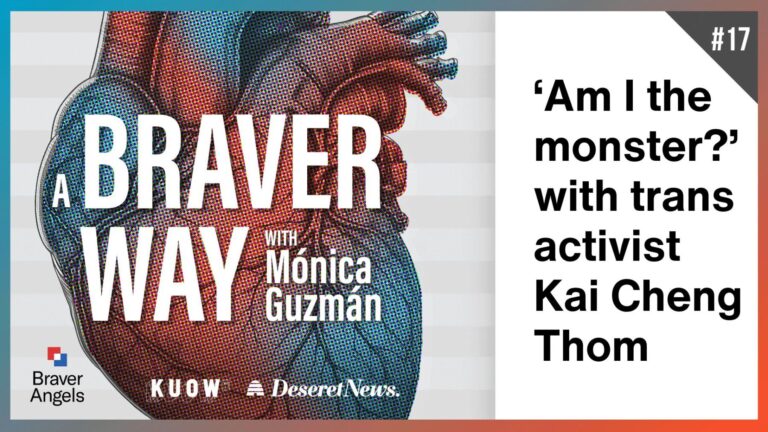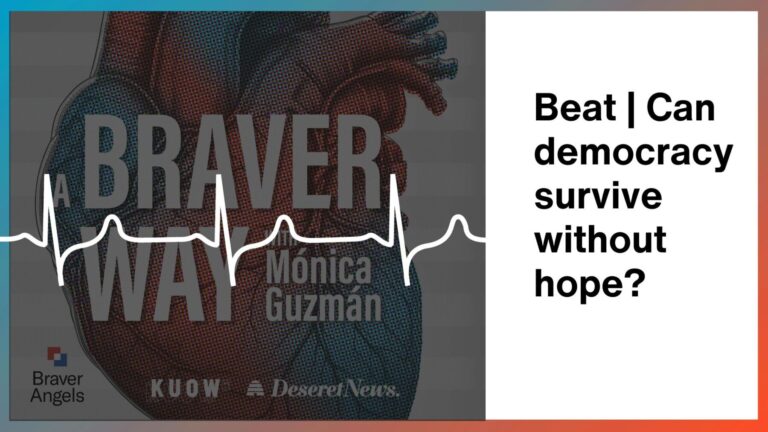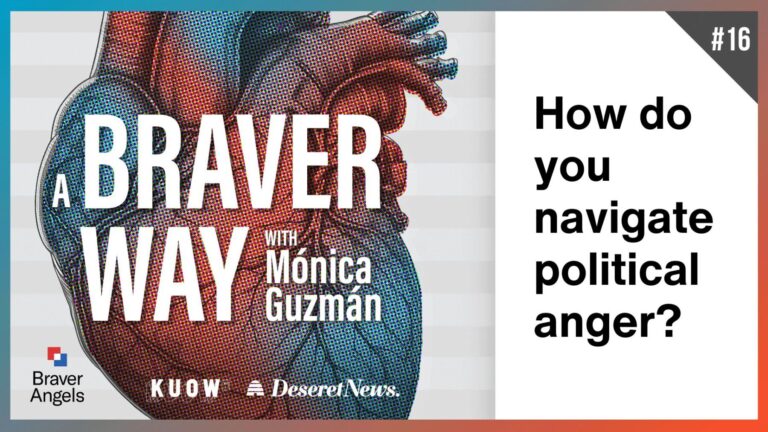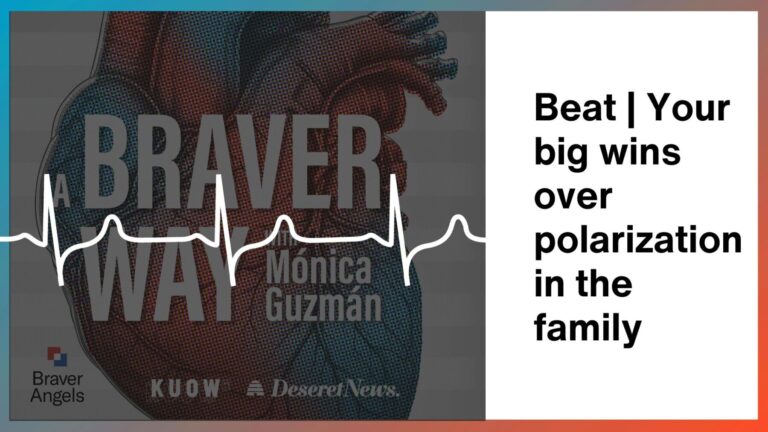“You could be wrong.” It’s a phrase that greets students in Bill Jordan’s high school classroom, and poses a challenge to everyone with a political opinion these days: Since no one is right about everything, how do you stay open to shifting your own beliefs? Bill opens up about his own journey, then we hear from listeners who tell us how they’ve changed their minds on some tough issues, like gay marriage, abortion, and more.
Host: Mónica Guzmán
Senior Producer & Editor: David Albright
Producer: Jessica Jones
Artist in Residence: Gangstagrass
Cover Art & Graphics: Katelin Annes
A production of Braver Angels.
Financial Supporters: M.J. Murdock Charitable Trust and Reclaim Curiosity
Sponsors: USAFacts
Media Partners: KUOW and Deseret News
Submit a question: If you’ve found yourself mulling on a concern or reflection as you’ve listened, turn it into a question and share it with us in a quick email to abraverway@braverangels.org.
Subscribe: If you like what you’ve heard, hit subscribe, and leave us a 5 star review!
Share this episode: https://braverangels.org/a-braver-way-beat-episode-6/
Follow us: Instagram | X/ twitter | TikTok | Youtube
Join our text line: Text “brave” to 206-926-9955 to join
Join Braver Angels: Become a Braver Angels member
Set up a 1:1 conversation across the divide: https://braverangels.org/online/1-1-conversations/
(Music up and under)
Mónica Guzmán:
This season, we are proud to be partnering with two fantastic media organizations to help us reach more listeners like you. KUOW is Seattle’s NPR News station, and Deseret News is a multi -platform newspaper out of Salt Lake City. Help us by helping them. Learn how at KUOW.org/brave or Deseret.com/subscribe.
(Music out and change. Music up and under)
Mónica:
Hey everyone, it’s Mónica, and you may want to brace yourselves because I’m going to kick us off with a horrible, terrible, no good everyday truth.
Every single one of us is wrong about something.
David McRaney:
Ask yourself, are you right about everything? And if the answer is no, then ask yourself the second question. What are you wrong about? And that should make you feel weird. Like, oh, I don’t know. So I must be wrong about some things, maybe a lot of things, but I don’t know what I’m wrong about.
Mónica:
None of us knows what we’re wrong about, which brings us to the heart of this week’s beat. Do we dare to find out.
That voice you just heard was David McRaney from our last episode. He’s a science journalist who’s obsessed with how we change our minds about things, including big things like politics. When he pointed out that that question, “what am I wrong about?”, helps us stay smart in a world that seems to prefer we stay in line, I thought of somebody I met when I spoke to students and teachers at a well -known high school in New England. In teaching his students to see past their assumptions, he ended up learning more about how to see past his own. And in the process, he’s turned the possibility of being wrong into a new kind of courage.
Bill Jordan:
My name is Bill Jordan. I teach history at Phillips Exeter Academy. It’s a boarding school in New Hampshire. You know, I’ve been a fairly straightforward liberal my whole life.
I came from a very liberal family. My father’s, my father was not a sports fan, but I think he followed politics as if it was sports, and his favorite team was the Kennedys, and his favorite opponent was Nixon. When I started teaching the politics course, it’s a course called American Politics and Public Policy. And I realized that I had to, I couldn’t just indoctrinate the kids in my way of thinking. So when I was selecting readings for them to do, I had to read more widely and read things that I didn’t tend to read.
You know, I always tended to read the New York Times, and I used to subscribe to The Nation, you know, pretty mainstream left of center publications. And I started reading things like the National Review and other conservative publications and to try to find readings to balance things off.
But in the process of doing that all, it’s made me change my view in a lot of ways and become less of maybe a “knee -jerk liberal.” And to consider that, yeah, I was wrong about some things, and there’s some things that the conservatives really have to offer. So I would say out of all the issues, labor is probably my number one issue. I believe firmly that one of the problems we have is the decline of the labor movement, you know, that this was a better country when more workers were unionized. And, you know, so I have presented to my students’ balanced readings that gave pro and anti -labor viewpoints.
And I just remember one year, I came, you know, after the end of the discussion, they all were more persuaded by the anti -union stuff that I gave them. I was horrified in a way, but I understand, you know, it made sense. And I have been, I understand the arguments better now. And I think it’s made me more of a better advocate for the unions and the, and the need for them.
I haven’t changed my position on it, but I sort of, I understand the argument. I stand the parts of it that are very valid, you know. There’s a book that I read a while back. It’s called A Political Classroom.
It’s a really wonderful book about how teachers teach civics in this country. It was a great book because they just talk about what kind of citizens we need to have to make our democracy work. And so, one of the things that they said in the book is that there’s a question that every citizen should be asking themselves so that they can interact with people who disagree with them.
And the question is, “could I be wrong?”. Well, I do two things, really. To try to promote this idea and have it stick with the kids. Because, you know, they’re in my class for a short time. And I don’t know what they’re getting from other teachers and other places or whatever.
And so, I want them to remember the lesson, you know, epistemic humility. Question your own beliefs. This is a bumper sticker. I used to have my car. It’s a picture of, you know, the famous Uncle Sam wants you for the, for the U .S. Army from World War I. He’s pointing at the camera. And this woman who does the photocopying in our department was able to change the words to say,
“you could be wrong.” So he’s pointing out at the viewer saying, you could be wrong, reminding them to ask that great citizenship question. The idea that democracy includes compromise, is something that people on both sides don’t seem to understand. But you can’t get anything done if you don’t compromise. And you can’t compromise if you think the people that you’re compromising with are irredeemably deplorable.
So, the fragility of democracy and the role of the history teacher in America, I think it’s huge. So, I take it really seriously.
Mónica:
You all know by now that I can’t hide when I’m geeky excited about something. So, when Bill first showed me his Uncle Sam, you could be wrong, poster, well, yeah. The copy he gave me sits by my desk, as perfect a placard for civic humility as I can imagine.
It’s reminding me to take pride in my opinions and to never get too comfortable with them. Teachers like Bill are giving the next generation some of the skills we could all use more practice with. But it’s clear to me that some of us, some of you, are already doing it, already daring to wonder what you might be wrong about, already allowing yourselves if the evidence compels you to change your mind.
I asked you on our text line to tell me about a time you’ve changed your mind about something political. Here are just a few of the stories you shared.
Sandra in Colorado, who Leans conservative, changed her mind about gay marriage.
“I thought marriage was a religious concept, so I thought it should be decided within faith communities,” Sandra writes. “When a gay friend got cancer and her partner faced significant bureaucratic challenges when trying to care for her, I realized the ability to be legally recognized as a family was a civil right, so I changed my mind.”
Linda, who’s also in Colorado, and lean’s Liberal, changed her perspective on abortion.
“I am strongly pro-choice when it comes to women’s reproductive rights and used to feel it was important that we protect the right to abortion nationwide,” Linda writes. “After listening to more pro -life women who also feel strongly about this very personal issue, I understand that there are regional differences and nuances, so I now feel that each state should have more flexibility to decide.”
Abortion also played into a change of heart for Bob in Arizona, who leans conservative.
“I gained an understanding of why someone would feel like they were compelled to seek an abortion due to physical threats from an abusive father or spouse or boyfriend,” he writes. “I gained that understanding from listening to an interview with a pro -abortion advocate.”
Last but not least, Lucy in Minnesota, who leans liberal, changed her mind about how to interact with people on the conservative side in two instances she told us about.
“Hearing an unemployed minor tell his story of despair, I understood why he voted for Trump. Before his story, I did not understand voting for Trump,” she writes. “The second change for Lucy came when she heard from a conservative South Dakota farmer. “He was so afraid of being vilified for using the wrong pronoun or using the wrong name for a group,” she writes. “He didn’t want to go out and engage with people. It changed my mind about how we talk to the other side.”
That feeling of being wrong can seem horrible, terrible, and no good, until you land on something that feels to you to be closer to truth. So cheers to the moments, big or small, where you have changed your mind about something tough.
And to everyone who’s lit up a path, someone else followed toward what felt to them like an upgrade in their own beliefs? Thanks. I can’t speak to the final answers here, the winning plays in the game show of our politics. But if enough of us keep asking what we’re wrong about, I’m feeling confident, for now, that we can get a higher score.
(music out)
And with that, thank you all so much for joining us for this beat episode of A Braver Way. A Braver Way is produced by Braver Angels and distributed in partnership with KUOW and Deseret News.
We get financial support from the MJ Murdoch Charitable Trust and reclaim curiosity and count USA Facts as a proud sponsor.
Our senior producer and editor is David Albright. Our producer is Jessica Jones. Our theme music is by the fantastic number one Billboard bluegrass charting hip hop band Gangstagrass.
A special thank you to Ben Caron, Don Goldberg, Gabbi Timmis, and Katelin Annes. I’m your host and guide across the divide, Mónica Guzmán. Want to share your thoughts or story with us? You can always reach us at abraverway@braverangels.org or join our text line by texting the word BRAVE to 206-926-9955.
Take heart, everyone. Till next time.
Braver Angels is the nation’s largest cross-partisan volunteer -led movement to bridge the political divide and the organization that produces this podcast.
And here’s the exciting part. You can join us in our mission to overcome toxic polarization and strengthen our democratic republic. Head to braverangels.org/join to become a member and support our growing movement.
And let them know a braver way sent you.
